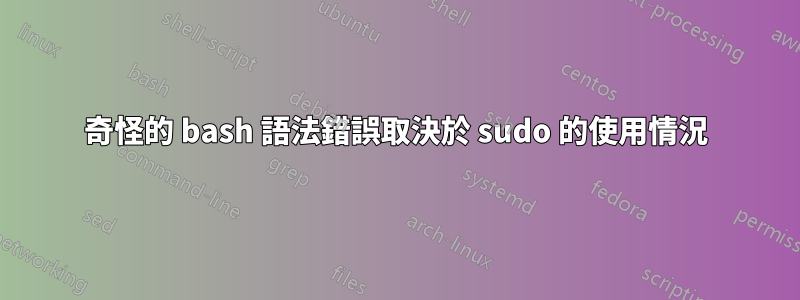
我創建了這個 bash 函數,透過檢查執行命令的用戶的 uid + 主目錄來檢測運行的用戶是否實際上以 root 用戶身份登錄,而不是使用 sudo:
#!/bin/bash
set -x
function check_root(){
home=`sh -c 'cd ~/ && pwd'`
if [ "$home" != "/root" ] || [ "$(id -u)" != "0" ]; then
echo -e "This script can only be executed by the root user, not with sudo elevation"
exit 1
fi
}
check_root
當我作為普通用戶(uid 1000)運行它時,它按預期工作:
++ check_root
+++ sh -c 'cd ~/ && pwd'
++ home=/home/jake
++ '[' /home/jake '!=' /root ']'
++ echo -e 'This script can only be executed by the root user, not with sudo elevation'
This script can only be executed by the root user, not with sudo elevation
++ exit 1
當我以 root 身份運行它時,它也按預期工作:
++ check_root
+++ sh -c 'cd ~/ && pwd'
++ home=/root
++ '[' /root '!=' /root ']'
+++ id -u
++ '[' 0 '!=' 0 ']'
但是當我以普通用戶(uid 1000)身份使用 sudo 提升運行它時,我得到:
./check_root.sh: 4: ./check_root.sh: Syntax error: "(" unexpected
系統資訊:
Linux jake 3.11.0-26-generic #45~precise1-Ubuntu SMP 7 月 15 日星期二 04:02:35 UTC 2014 x86_64 x86_64 x86_64 GNU/Linux
bash --版本 GNU bash,版本 4.2.25(1)-release (x86_64-pc-linux-gnu)
答案1
我同時解決了這個問題,但尚未發布解決方案 - 結果與語法相關:
工作解決方案:
function check_root {
stuff..
}
和
function check_root () {
stuff..
}
例如,從函數宣告中刪除 () 或確保其兩側以空格分隔即可修復此問題。
這是我在 bash 線上說明頁中發現的內容,讓我發現了錯誤:
Shell Function Definitions
A shell function is an object that is called like a simple command and executes a compound command with a new set of positional parameters. Shell functions are declared as follows:
name () compound-command [redirection]
function name [()] compound-command [redirection]
This defines a function named name. The reserved word function is optional. If the function reserved word is supplied, the parentheses are optional
但是..我不知道在這種情況下到底是什麼讓 bash 表現得如此。


